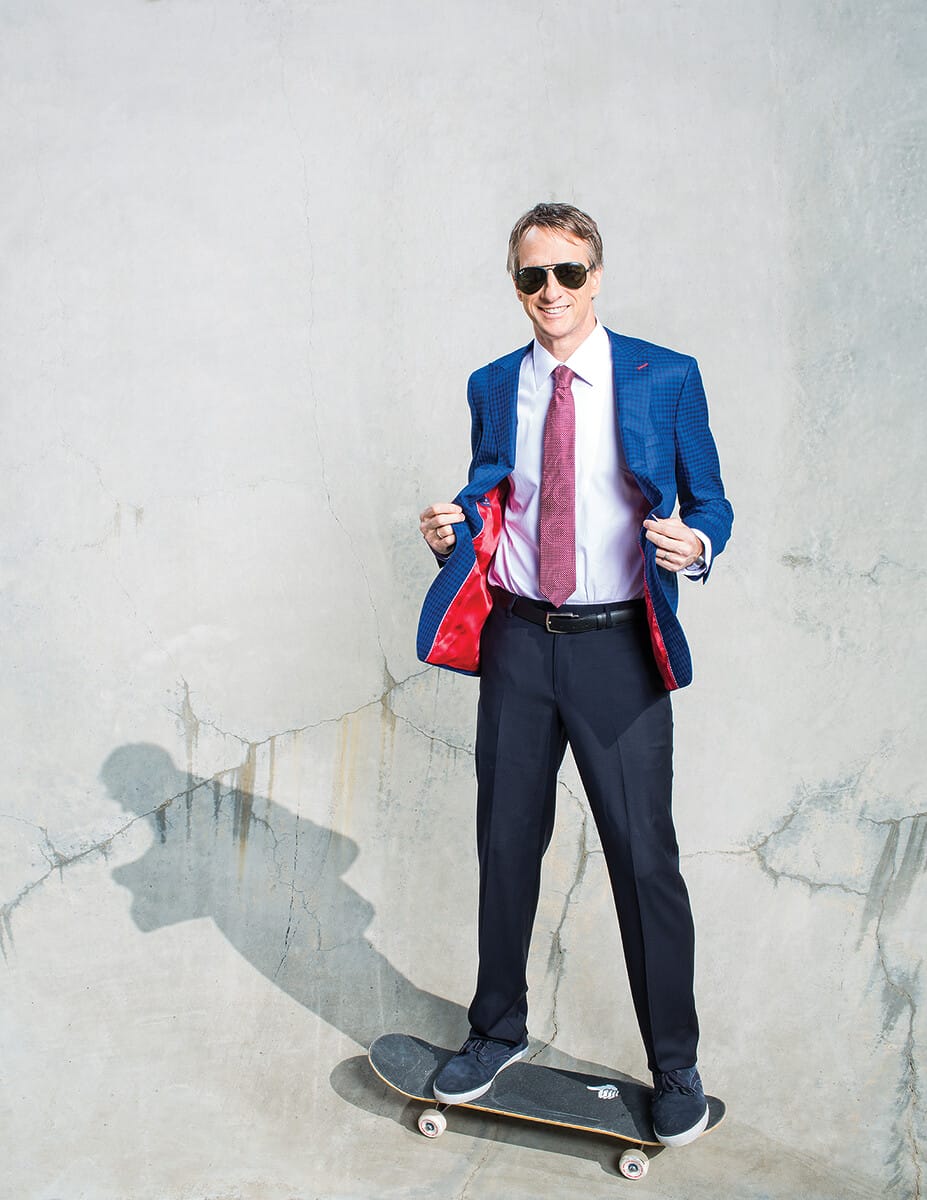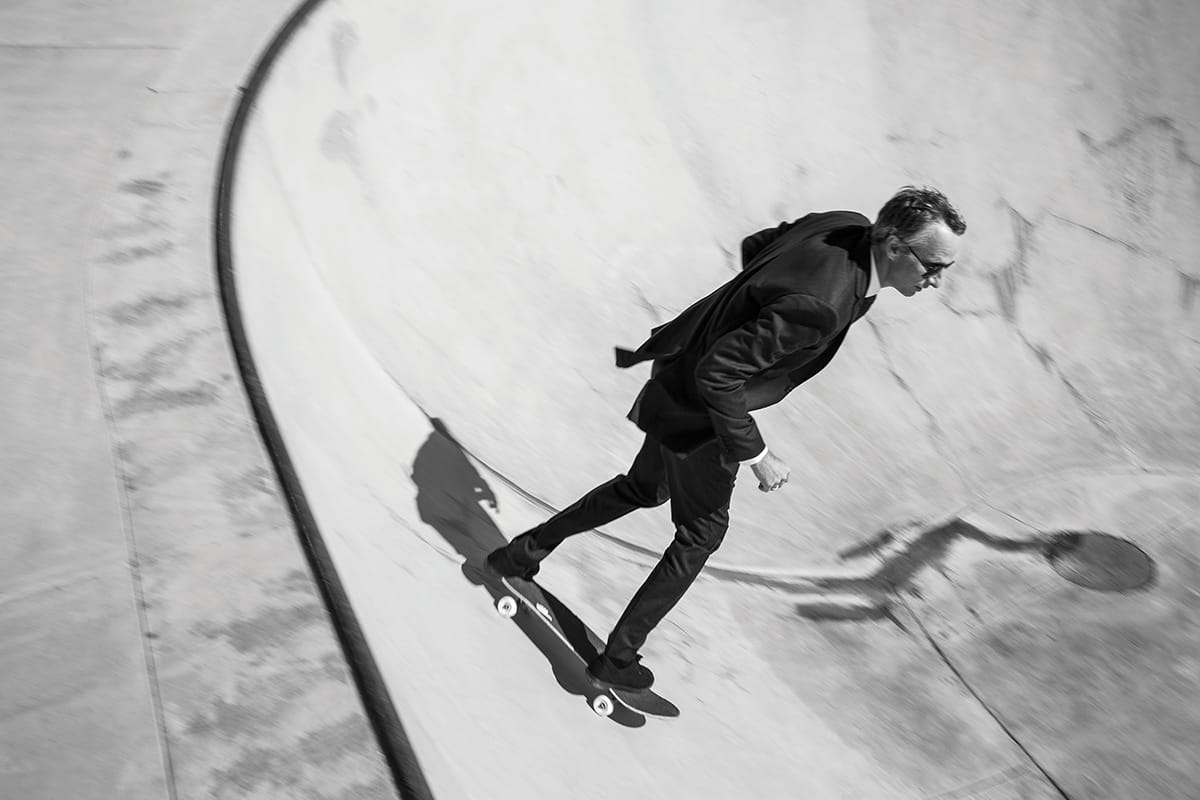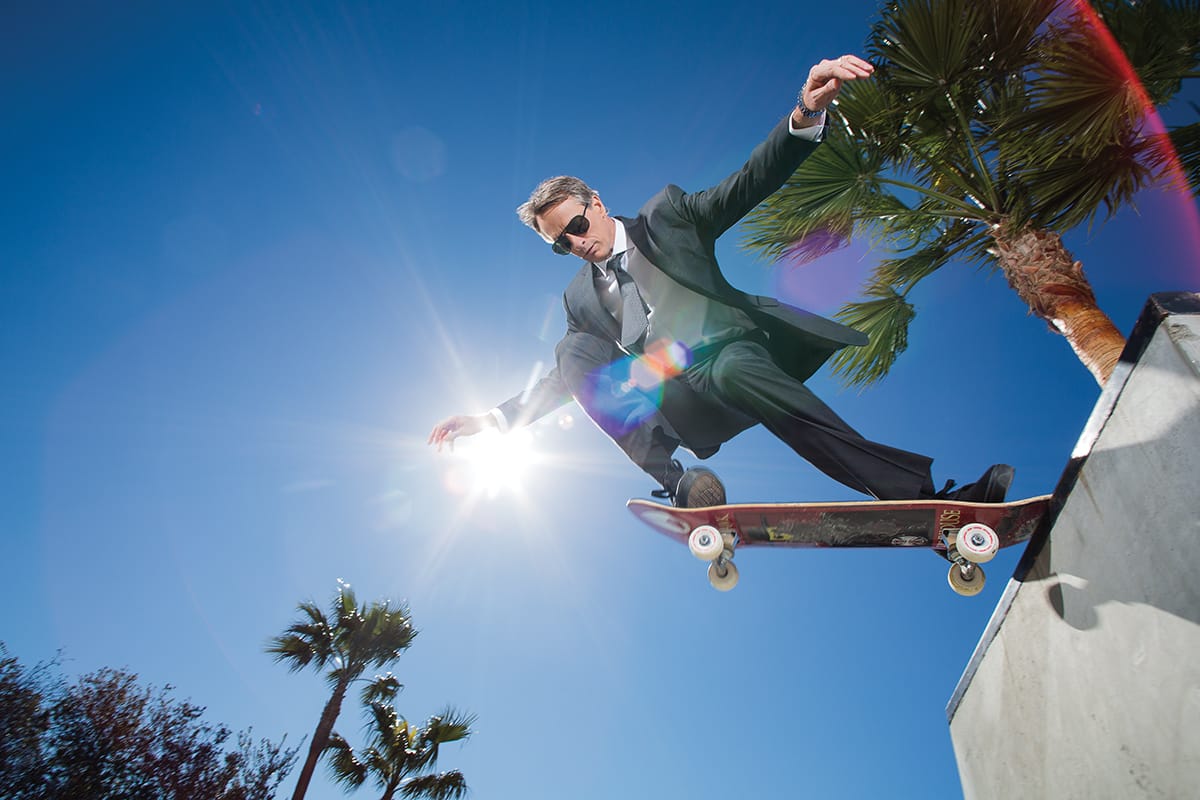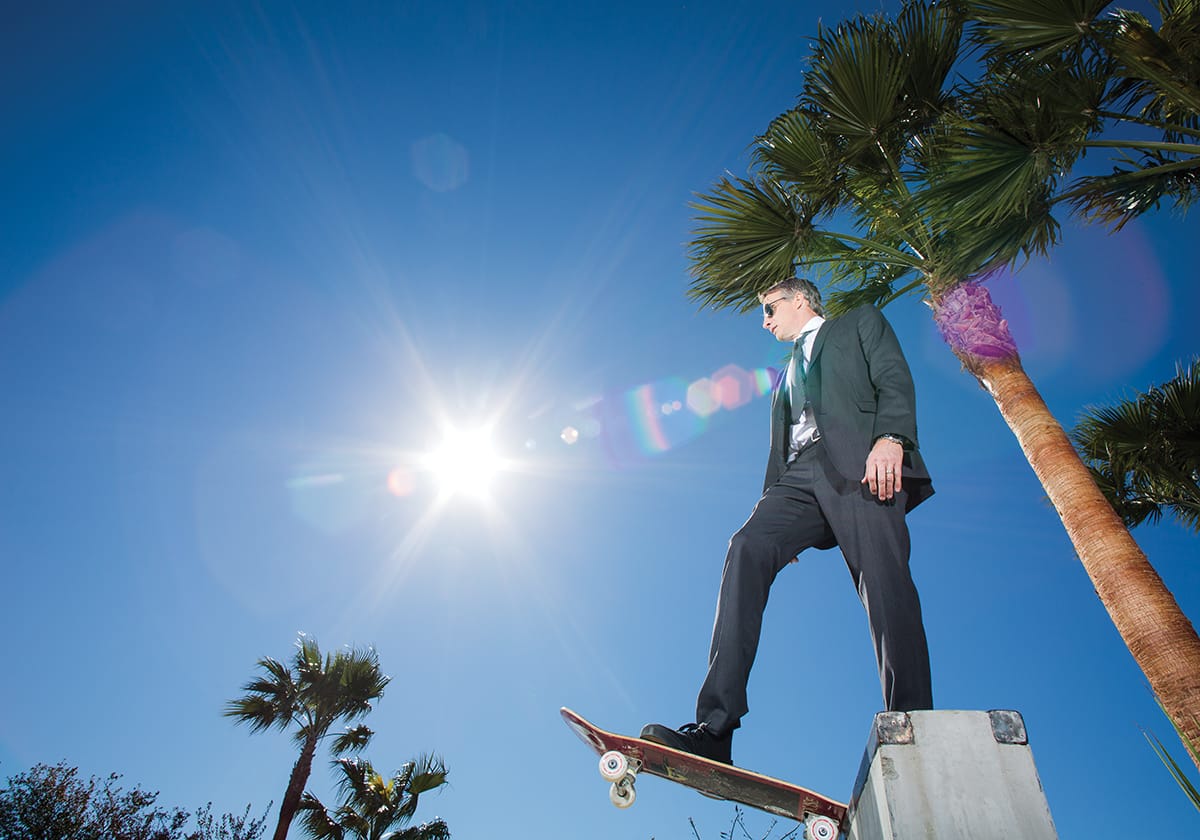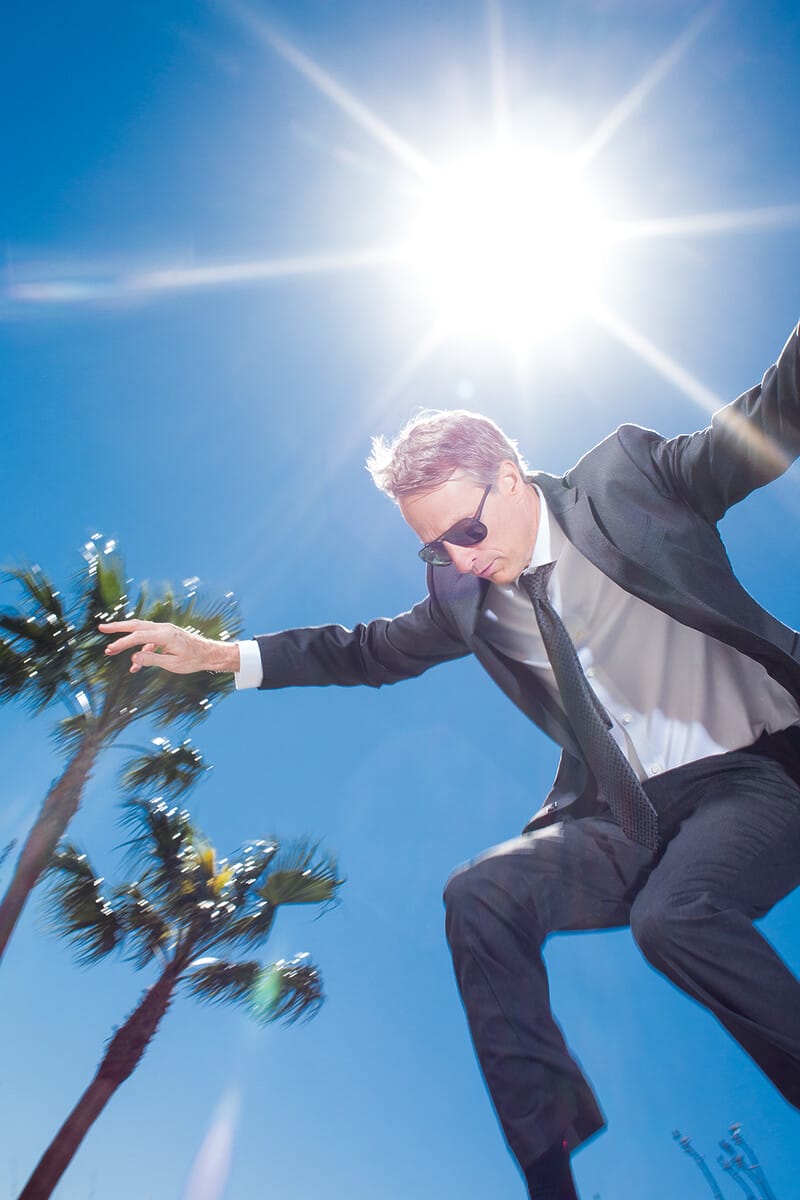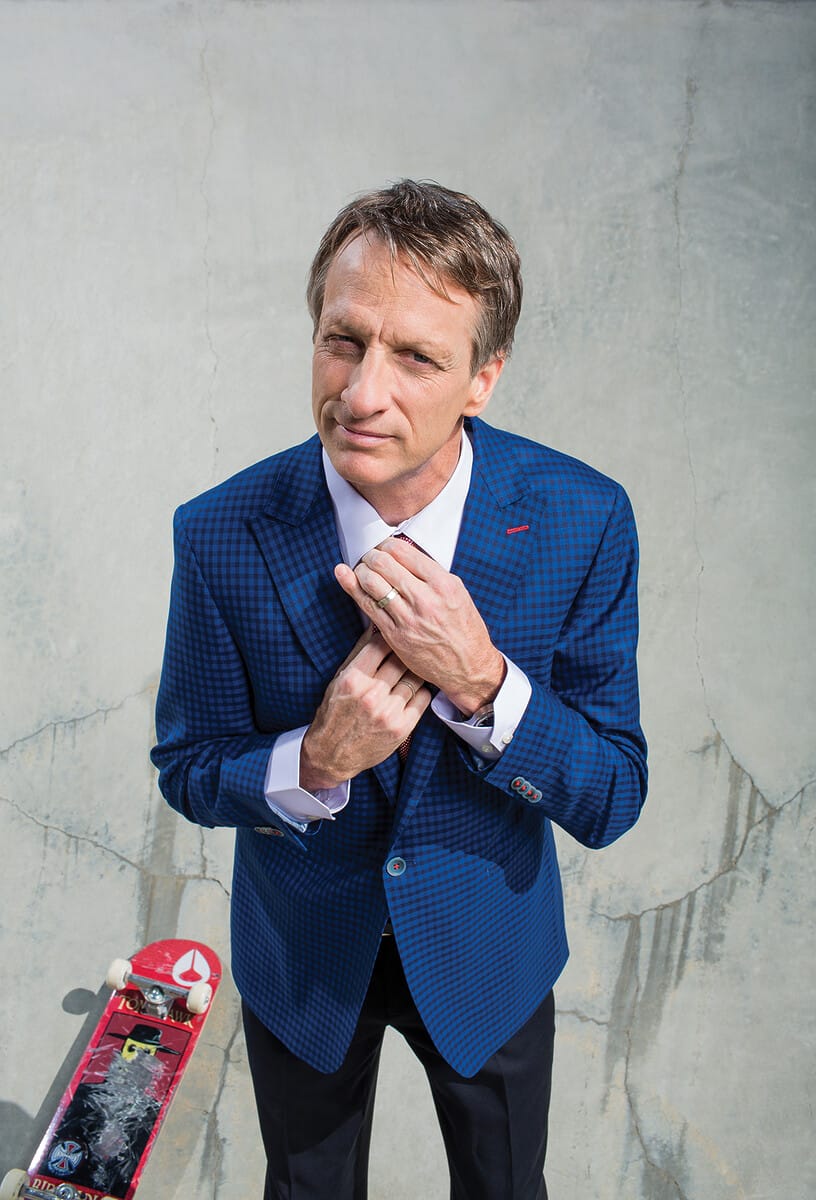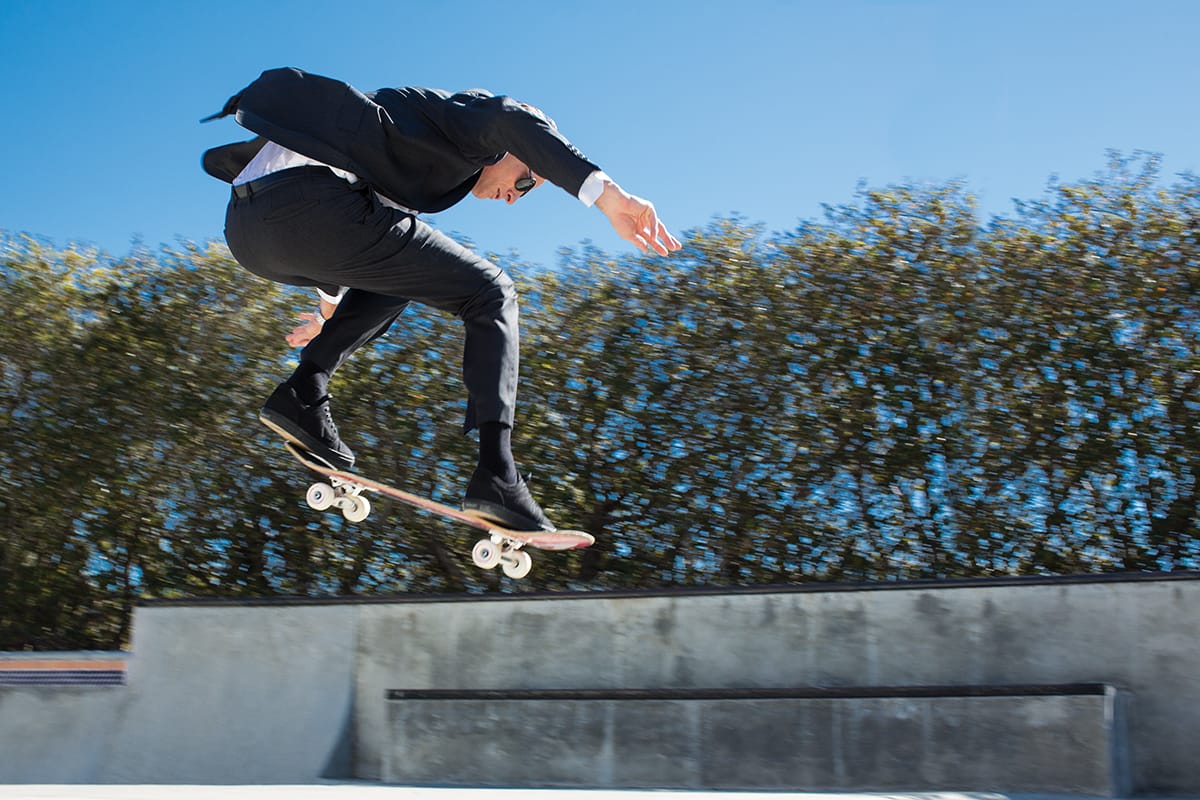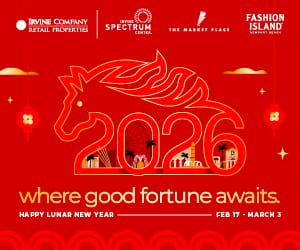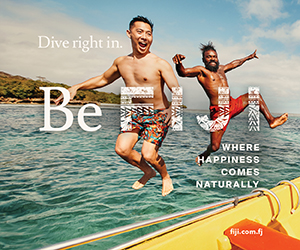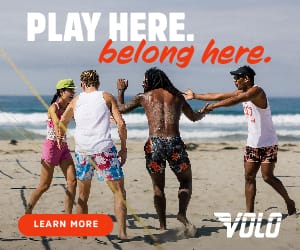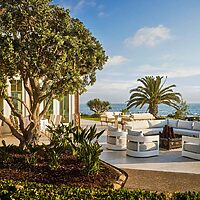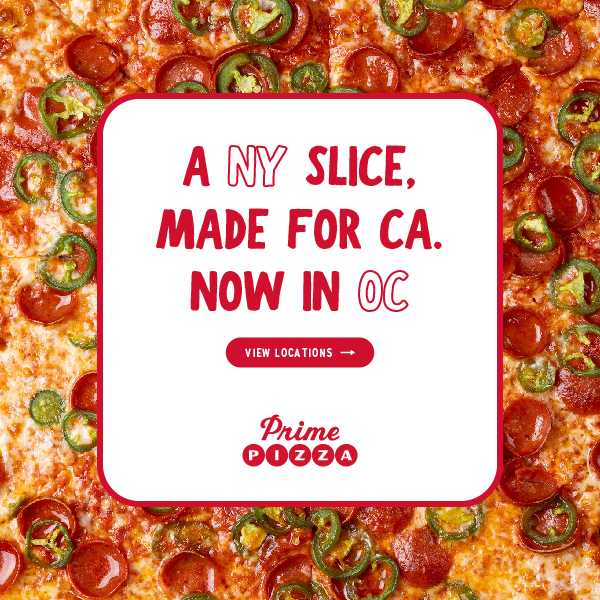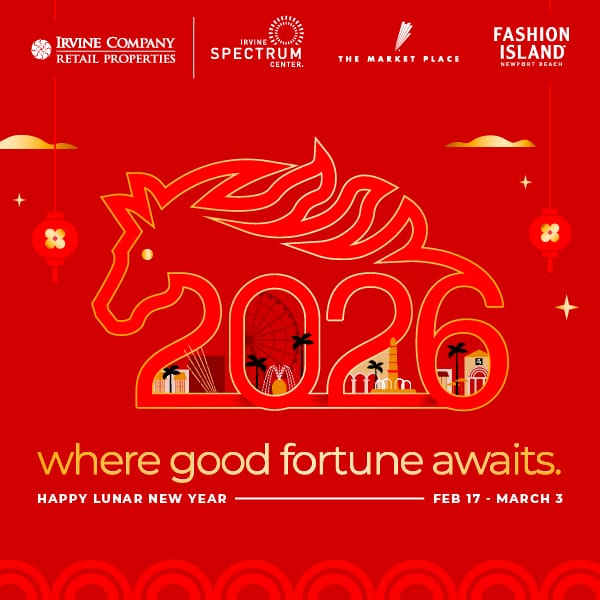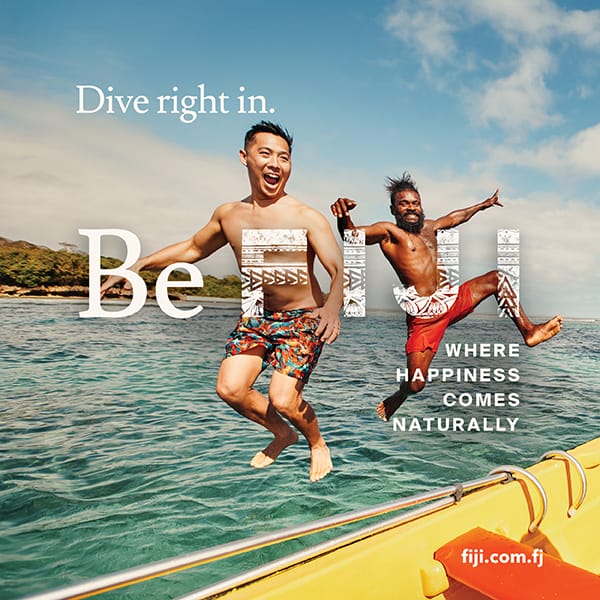An In-Depth Look at the Life of Tony Hawk, On and Off the Skateboard
One of the most prominent professional athletes to come out of San Diego, Tony Hawk is known as a pioneer of vertical skateboarding and has led a 17-year career as a professional. Born and raised in America’s Finest City, Hawk turned pro at the early age of 14. Since then, he’s credited with completing the first documented 900 (rotating 900 degrees or 2.5 times in an aerial spin on a skateboard ramp), developing his successful namesake video game series and creating his foundation to finance public skateparks in underprivileged areas, among many other things. Although he’s now retired from the competitive sport, Hawk still has a few tricks up his sleeve.
Q: How did growing up in San Diego shape your career?
Tony Hawk: Skateboarding was born in Southern California, so it was accessible to me at an early age. I was lucky to live here, where one of the last skate parks from the 1970s boom—Del Mar Skate Ranch—stayed open until 1987. It was my home away from home every day after school, and it’s where I cultivated my skating style and direction.
Q: What was it about skateboarding during the early years that drew you to the sport?
TH: The daredevil aspects and the idea that I wouldn’t have to listen to a coach or rely on others for my own success.
It felt like an art form as much as a sport, and the canvas was relatively blank in those days.
Q: How did you earn the nickname “The Birdman?”
TH: Someone said it on-air during an early X Games event and it seems to have stuck.
Q: How did you feel after landing that first 900?
TH: It was a huge relief. I had been chasing that trick for nearly 10 years up to that point, and had almost given up on it entirely. I considered ending my competitive career around that time and it provided me a high note to end on.
Q: After becoming a professional skateboarder at age 14, how did you stay motivated to keep progressing in your career?
TH: My focus was always new tricks and techniques, so it was never about winning competitions, being famous or getting rich.
I continuously challenged myself, and still do to this day.
Q: In the early 1990s when skateboarding was out of the public spotlight, you’ve said publicly that you dealt with financial hardship. Was it difficult sticking with skateboarding during those tough times?
TH: I did whatever I could to keep skating and stay within the industry—from editing skate videos for other companies to doing exhibitions in amusement parks and state fairs for very little money. But I was still “living the dream” so to speak, because I did get to ride my skateboard every day, and pay the bills in doing so (barely).
Q: What were some of the most pivotal moments in your career on and off the ramp?
TH: Getting recognized by Stacy Peralta at age 12 and being asked to join the Bones Brigade film; turning pro at age 14 and winning a competition that same year; starting my own skate company; aligning with Activision to create the Tony Hawk’s Pro Skater video game series; landing the first 900; being on The Simpsons; and—in recent years—discovering the power of social media.
Q: Have you ever delved into any other sports?
TH: I played basketball and baseball to marginal success as a kid, but I quit them both once I found skateboarding.
I now surf and snowboard for fun.
Q: What factors were involved with your decision to retire in 1999?
TH: I had competed for 20 years of my life at that point, and I wanted to explore other opportunities within skateboarding and action sports in general.
Q: What is your day-to-day involvement with Birdhouse Skateboards?
TH: It mostly involves keeping in touch with the team and helping them with opportunities outside of our industry, such as films, promotions and endorsements.
Q: How do you feel your legacy has changed the skateboarding industry?
TH: I can only hope that I’m known for raising the profile of skateboarding in a general sense, but mostly that people recognize me for being an innovative skater.
Q: I understand the Tony Hawk Foundation helps finance public skateparks in low-income areas across the country. How do you feel those skateparks help America’s youth?
TH: I believe they give challenged kids an outlet and a creative space that’s important to their identity and sense of self-confidence. I also believe in the power of getting these youth involved in the advocating for their parks through city councils and fundraising.
Our foundation can help guide them, and give them funding in the process.
Q: Tell me about your skate clothing line, Hawk Clothing.
TH: The catalyst for creating Hawk Clothing was when my siblings and I had children around the same time but weren’t able to find cool clothes for them. Now it’s a young men’s line that represents skateboarding and action sports cultures at affordable prices. We are very proud of how far it’s come, and the international opportunities that Cherokee is now providing.
Q: How do you think the Tony Hawk’s Pro Skater video games have changed the skating industry?
TH: The interest in actual skating grew exponentially with the release of Tony Hawk’s Pro Skater and its sequels. Even people who had no interest in trying skating became interested in it and understood what it’s all about.

Q: What was your inspiration for organizing the Boom Boom HuckJam Tour?
TH: I saw our sports rise from fringe activities to a growing appreciation from mainstream audiences, but we were still a sideshow to bigger events when it came to doing exhibitions. I felt like it was time to be the headlining act, even though we had big-name bands touring with us. Prior to Boom Boom HuckJam, the only time our sports were front and center was in a televised competition format. The stars of our first few tours were household names and I thought they should be highlighted as such.
Q: Since you’ve already accomplished all your career goals, what’s next for you?
TH: I am still amazed at the opportunities that come my way, so I’m just enjoying the ride these days. My main objective is to share this good fortune with my family, and show them the world whenever possible.
I don’t know what’s next, but I embrace the changes and challenges in this uncharted territory of skating for a living at my age.
Q: You were married last year and have four children. How do you balance family against a demanding work schedule?
TH: I try to include them as much as possible in whatever I’m doing, and keep travel time to a minimum. I’ll fly to Europe and back for an event in the span of three days if my family can’t join.
In other words, I sleep on planes and get the job done with very little downtime when I’m away.
Q: What is it like to see your son Riley following in your skateboarding footsteps?
TH: It’s a treat to see him carve his own path and accept the challenges of being a pro skater. I’m very proud of him and excited for his future prospects.
Q: You’ve had several film and television roles throughout the years—is that something you enjoy doing and plan to do more of in the future?
TH: Only if it’s a cameo—I’m not trying to parlay my success as a skater into a Hollywood career. Nor will I make a rap album anytime soon.
Q: Rumor has it that you were the first person permitted to skate on White House grounds. Was that a typical day of skating for you, or did it feel especially significant?
TH: I wouldn’t say I was permitted! It was very spontaneous because I had my skateboard with me and found myself alone in a hallway. And I was with an official White House guide who shall remain unnamed. I rode across the tile and he shot a photo of it, which I then shared via Twitter. It caused a bit of controversy. So it was not a typical day for me, but I would do it again without hesitation.
Tony Hawk’s Favorite Local Skate Parks
- Magdalena Ecke Family YMCA in Encinitas
- Alga Norte Community Park in Carlsbad
- Alex Road Skatepark in Oceanside
- His own ramp
Tony Hawk’s Skate Park Essentials
- His kids
- Kneepads
- Helmet
- A Nixon Blaster speaker
- Plenty of water
Family Life
When he’s not skating, Tony spends time with his family at the beach, Legoland, or the San Diego Zoo. They also love dining at Market Restaurant + Bar in Del Mar.
Photographed By: Noble Andrews
Styled By: Amanda Gerardo and Brian Bond
Kai Oliver-Kurtin is a San Diego-based writer who contributes to several national and regional publications, covering travel, dining and lifestyle.
- Kai Oliver-Kurtin
- Kai Oliver-Kurtin
- Kai Oliver-Kurtin



